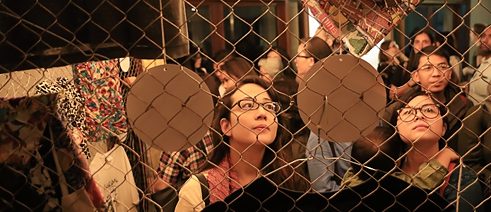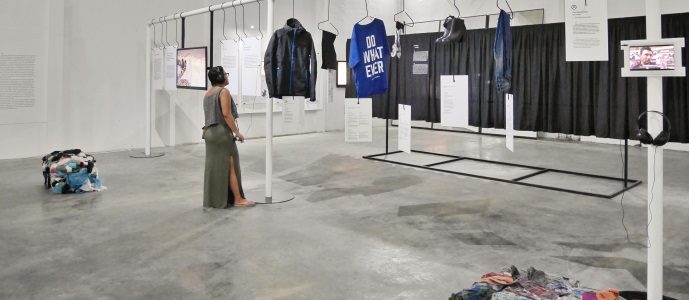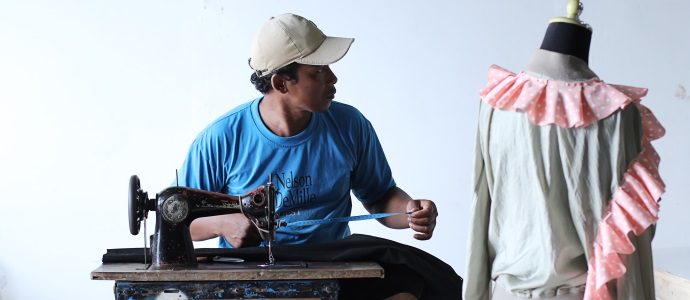IKAT/eCUT in Jakarta
Fast Fashion is Unfashionable

Traditional handcraft, fair production, contemporary design: The IKAT/eCUT project’s textile residencies bring six designers from Germany together with producers of traditional textiles in Indonesia, Malaysia, the Philippines and Thailand. Fast Fashion – The Dark Side of Fashion is an exhibition in the context of the project.
Textiles are about to change our world: as carriers of modern technology, they can now do far more than just protect us from heat and cold. Ikat is a traditional fabric of Asian origin that gets its typical patterns by means of a special dyeing technique.
Besides pottery, the textile art is humankind’s oldest technology. At the same time, the textile raster is the original network of the digital revolution, which can radically influence and alter forms of communication, environmental awareness and our realm of experience in the future. The IKAT / eCut project now combines the tradition and the future of textiles within the framework of a unique residency program.
Textile imbalance
The fashion world is dominated by the constant desire for new collections, better prices and faster production. At the same time, it is one of the most important industries in the world. Ninety percent of the apparel on the European and American markets is produced cheaply in countries like China, Bangladesh, Vietnam and Cambodia. The wages of the textile workers make up no more than one or two percent of the total of the calculated merchandise prices.In March and April 2017, the IKAT / eCUT textile project will work on textiles, design and sustainability in Jakarta.
Fast Fashion – The Dark Side of Fashion
 Part of the exhibition
| Photo: Shera Rindra
The focus of a variety of events is on the exhibition Fast Fashion – The Dark Side of Fashion, which invites the public to take a look behind the scenes of the textile industry, fashion and the world of consumption. It critically illuminates the impacts of mass production and demonstrates sustainable alternatives.
Part of the exhibition
| Photo: Shera Rindra
The focus of a variety of events is on the exhibition Fast Fashion – The Dark Side of Fashion, which invites the public to take a look behind the scenes of the textile industry, fashion and the world of consumption. It critically illuminates the impacts of mass production and demonstrates sustainable alternatives.
Consumption, economics and ecology
The system of the clothing industry and its global socioeconomic and ecological consequences will be examined from different perspectives: fashion and sacrifice, poverty and excess, global and local, wages and earnings, clothing and chemicals, apparel and eco-balance.“Fast Fashion” denotes the specific conditions of mass production, which inexpensively reproduces and sells brand products. This type of fashion has created a new type of consumer who owns a disposable couture without taking the circumstances that lead to the product into account.
Slow Fashion Laboratory
In contrast, the Slow Fashion Laboratory presents sustainable fashion, textiles, initiatives and practices, primarily from Indonesia. It works with raw materials, upcycling or technical processes. Visitors gain an insight into an ethically irreproachable wardrobe and the entire production process behind it.Fringe programme
A number of events on the topics of fast fashion, slow fashion and DIY culture will accompany the exhibition. They explicitly offer visitors opportunities to create, develop and learn themselves. The Repair Fair
| Photo: Ramos Pane
But the project also poses questions. How can a t-shirt cost less than a cup of coffee, a dress cost less than an ice cream cone, but a pair of jeans as much as a cinema ticket? What does this tell us about the quality of fashion? Who are the real “fashion victims”? In this, the exhibition not only looks at the future, but also the dark sides of the fashion industry.
The Repair Fair
| Photo: Ramos Pane
But the project also poses questions. How can a t-shirt cost less than a cup of coffee, a dress cost less than an ice cream cone, but a pair of jeans as much as a cinema ticket? What does this tell us about the quality of fashion? Who are the real “fashion victims”? In this, the exhibition not only looks at the future, but also the dark sides of the fashion industry.